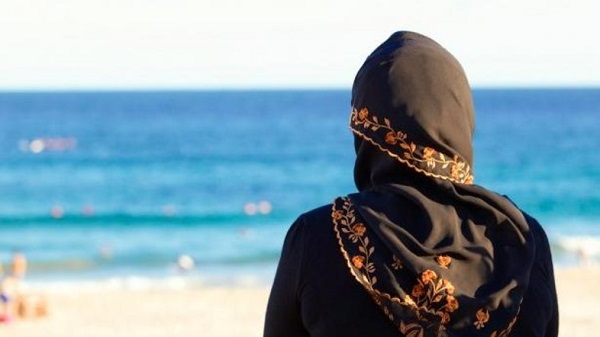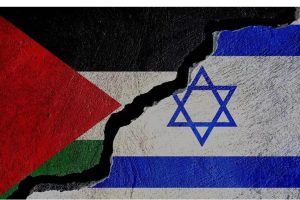hijab-sea-300x169.jpg" alt="Muslimvillage.com" width="300" height="169" /> Muslimvillage.com
By Jamile Charkie
“And say to the believing women that they should lower their gaze and guard their modesty; that they should not display their beauty and ornaments except what must ordinarily appear thereof; that they should draw their veils over their bosoms and not display their beauty except to their husbands, their fathers, their husbands’ fathers, their sons, their husbands’ sons, their brothers, or their brothers’ sons or their sisters’ sons, or their women or the servants whom their right hands possess, or male servants free of physical needs, or small children who have no sense of the shame of sex, and that they should not strike their feet in order to draw attention to their hidden ornaments. And O you Believers, turn you all together towards Allah, that you may attain Bliss.” (Quran 24:31).
The West right now is afraid of Islam. The media has portrayed Islam in such a way that has brainwashed much of the West, calling Muslims terrorists, considering our women oppressed and having no rights. To the West, Islam is a face hidden behind a veil. Islam is mysterious and unclear to them, and I think this is what frightens them the most about us. They don’t know Islam; they don’t understand. They cannot see throught the veil, and it is precisely that which scares them.
To Western society, the veil suggests oppression. In a society where women pride themselves in showing themselves off to the world in every way they can, they cannot understand why a woman should have to cover herself. It shocks them even more to know that those women who use the hijab chose to. In thruth, Islam gives women many rights and high status.
Also Read: Imaam Yakhsyallah: Nurture Love for the Prophet, One Will Be with Whom One Loves
Muslim women cover themselves not as oppression, but because God instructed women to dress modestly. “O you Children of Adam! We have bestowed on you raiment to cover your shame as well as to be an adornment to you. But the raiment of righteousness, that is the best. Such are among the Signs of Allah, that they may receive admonition” (Quran 7:26). By dressing modestly, a woman can avert unwanted sexual attention, because a woman is more than a sexual object and should be seen as such. The hijab teaches a woman that there is more to life than beautifying oneself for the world, and that a woman should work on her self rather than focusing on her looks.
Covering up is not exclusive to Islam either; the virgin Mary is always depicted in very modest dress and even a head covering. Many women in certain Jewish communities also wear head coverings. Nuns wear head coverings. So why is it only oppressive when Muslim women wear it?
Did you know Islam gave women the right to inheritance when they had none? Or that Islam forbids a woman to be married against her will? Did you know Islam greatly encourages women to get an education and contribute to society? Islam obliges a husband to treat his spouse well and provide for her, as well as the children.
Did you know Islam forbids family violence? Or that the prophet (peace be upon him) once said “The most perfect of the believers in faith are the best of them in morals. And the best among them are those who are best to their wives” [Narrated in Mosnad Ahmad, #7354, and Al-Tirmizi, #1162]. Did you know that Islam allows divorce; something Roman Catholics are prohibited?
Also Read: Thanksgiving: An Islamic Perspective
Perhaps next time you see a woman in a hijab you will think twice before mistreating her. Perchance you will no longer see her as oppressed and voiceless, but as a strong and corageous woman standing up for what she believes in. Perhaps next time you watch your biased news reports about Islam you will take it with a grain of salt. Hopefully you will see that Islam is not what the media is feeding you. In the end, we are all children of Adam (peace be upon him). Don’t be afraid of the face behind the veil.
The views expressed in this article are the author’s and do not necessarily reflect those of MuslimVillage.com. (P07/R07)
Mi’raj Islamic News Agency (MINA)
Also Read: Achieving the Position of Fasting Expert with Kindness of Morality

































 Mina Indonesia
Mina Indonesia Mina Arabic
Mina Arabic